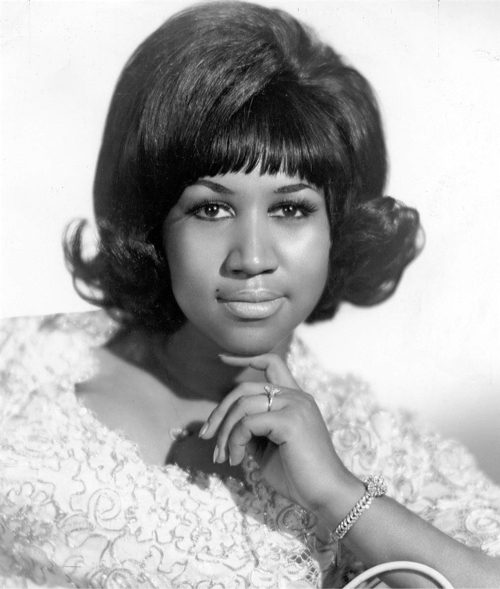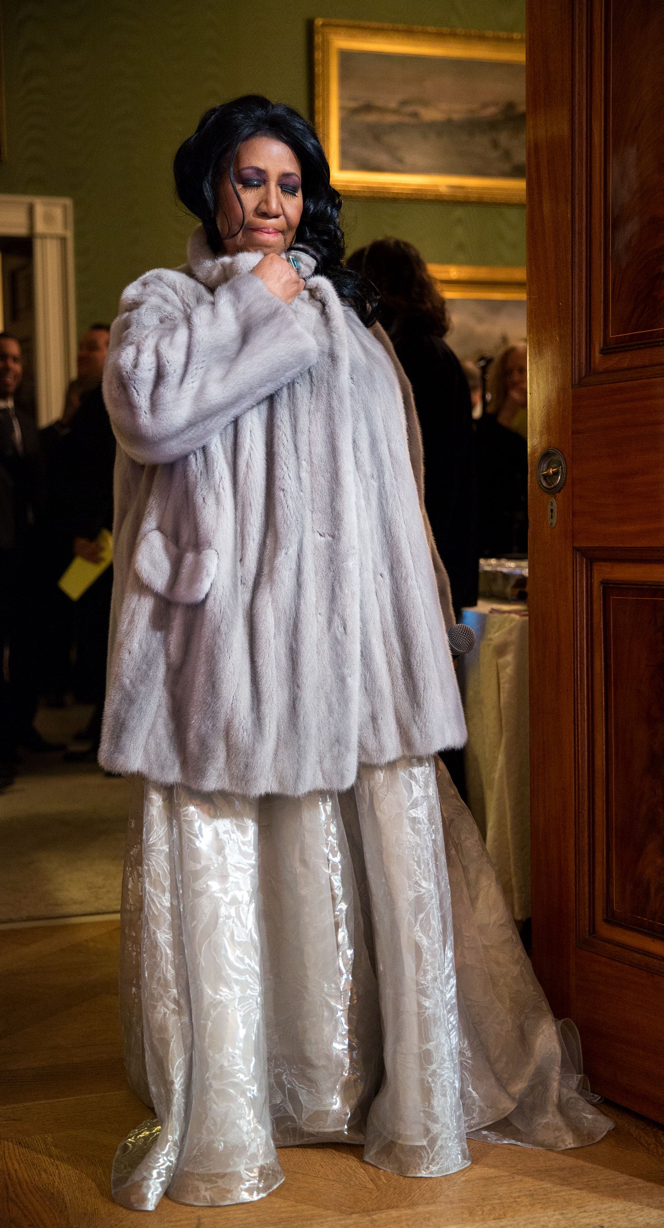
Like Elvis Presley, Ray Charles and an elite cadre of others, she ushered in a new era of popular music that would inspire and influence entire generations of listeners and musicians, providing a soundtrack to our lives that is so indelible it’s almost impossible to imagine a time without it. Yet Aretha’s influence transcended just music. She was a passionate advocate for Civil Rights, a shining symbol of female empowerment, and an inspiration to anyone looking for a little bit of R-E-S-P-E-C-T.

Aretha Louise Franklin was born in Memphis in 1942 to a large, musical family. Her father C.L. Franklin was a well-respected Baptist minister, whose emotionally-driven sermons earned him the moniker of the man with “the million-dollar voice,” while her mother Barbara was an accomplished pianist and vocalist. Together, her parents instilled in Aretha a deep love and appreciation for gospel music. When Aretha was two, her family moved to Buffalo, NY, but soon relocated to Detroit, which would remain Franklin’s home for the remainder of her life. Due to her father’s stature, Aretha’s home was often filled with the musical superstars of the era, including gospel greats Mahalia Jackson and Clara Ward, who helped to take care of Aretha and her siblings after her mother died unexpectedly before her tenth birthday.


When Franklin was 12, she began traveling with her father during his “gospel caravan” tours across the country, singing and playing the piano. As a teen, she signed a recording deal with J.V.B. Records, where she released her first single, “Never Grow Old” in 1956. Inspired by her idol Sam Cooke, Franklin decided to pursue a career in pop music and subsequently signed a deal with Columbia Records in 1960. Throughout the first half of the ‘60s, her Columbia recordings saw her experimenting with an array of genres including pop, jazz, the blues, and R&B, all tinged with a strong gospel overtone. Despite notching a few minor hits, Franklin’s years at Columbia suffered from a lack of direction and a blunting of her true power as a vocalist, hindering her from breaking into the mainstream. Thankfully, that would soon all change with a move to Atlantic.

“I think of Aretha as Our Lady of Mysterious Sorrows,” Atlantic Records’ Jerry Wexler once said of Franklin. “I don’t pretend to know the sources of her anguish, but anguish surrounds Aretha as surely as the glory of her musical aura.” At Atlantic, Wexler was able to help Aretha harness that anguish into some of the most emotionally resonate music ever put to wax. At one point, Wexler allegedly encouraged Stax Records owner Jim Stewart to purchase Franklin’s contract, but Stewart unwisely declined. In January of 1967, Franklin traveled to Muscle Shoals, Alabama, to record at the renowned FAME Studios. During that session, she recorded the song “I Never Loved a Man (The Way I Love You),” her first top-ten single. Three months later, Franklin released her cover version of Otis Redding’s “Respect,” which immediately climbed to the top of the charts, ultimately becoming the definitive song of her career. Soon after, Franklin released her debut album with Atlantic entitled I Never Loved a Man the Way I Love You, which was hailed as a modern masterpiece. More than any other artist, Franklin soon became the embodiment of not only soul music, but also the modern female archetype: vulnerable yet strong, battered yet far from broken.
Aretha’s hot streak continued throughout the decade as she released classic albums like Lady Soul and Aretha Now, as well as some of the most popular singles of her career like “Do Right Woman, Do Right Man,” “Chain of Fools,” “I Say a Little Prayer,” “(You Make Me Feel Like) A Natural Woman,” and “Think.” Although her music remained steeped in gospel, her expert adoption of other genres made her music accessible to a mainstream, secular audience who bought her albums in droves. As The New York Times notes in a profile, “The playfulness and harmonic sophistication of jazz, the ache and sensuality of the blues, the vehemence of rock, and, later, the sustained emotionality of opera were all hers to command.” In 1968, she won her first two Grammy awards.

As she dominated the charts and became one of the era’s brightest stars, Franklin also found time to immerse herself in the fights for civil rights, women’s rights, and even rights for Native Americans. Her hit song “Respect” had quickly become an anthem for each movement, but Franklin was determined to give more than just a rousing soundtrack to those struggles. She regularly appeared at protests and rallies, provided financial assistance to various advocacy groups, and frequently traveled alongside Dr. King. In 1970, she even paid for activist Angela Davis’ bail following her arrest, saying “Angela Davis must go free…Black people will be free. I’ve been locked up and I know you got to disturb the peace when you can’t get no peace.” In February of 1968, Franklin – then only 26 years old – was presented with a special award by Dr. King on behalf of the Southern Christian Leadership Conference in honor of her contributions to the Civil Rights Movement. Just months later, she was selected to sing at King’s memorial service back in the city of her birth, a city which now held a certain discomfort, Memphis, Tennessee. “Being the Queen is not all about singing, and being a diva is not all about singing. It has much to do with your service to people. And your social contributions to your community and your civic contributions as well,” she would later say.
Franklin’s commercial success continued into the early 1970s with the release of acclaimed albums Spirit in the Dark and Young, Gifted, and Black, as well as hit singles like “Don’t Play That Song (You Lied),” “Day Dreaming,” “Spanish Harlem” and “Rock Steady.” She also made a return to her gospel roots with the album Amazing Grace, a live church recording which sold over 2 million copies.


Following Jerry Wexler’s departure from Atlantic Records in the late ‘70s, Franklin signed with Clive Davis at Arista Records in 1980 and that same year appeared as a waitress in the popular movie The Blues Brothers, followed soon after with a performance for Great Britain’s Queen Elizabeth. As so few artists ever achieve, Aretha rejuvenated her career by staying current with music’s changing trends. After seven years, her Arista album Jump To It brought her gold once again. She tapped younger audiences and broke onto MTV with “Who’s Zoomin’ Who?,” as well as with her cover of The Rolling Stones’ “Jumpin’ Jack Flash” and her international number one hit “I Knew You Were Waiting for Me,” recorded with George Michael. In 1987, Franklin became the first woman inducted into the Rock and Roll Hall of Fame. She also received the Grammy Legend Award in 1991 and the Grammy Lifetime Achievement Award in 1994. Consistently reinventing her career for different audiences, Aretha performed at the 1998 Grammy Awards before a worldwide audience of over one billion viewers when she filled in for an ailing Luciano Pavarotti to sing the opera aria “Nessun Dorma.”
“The Queen of Soul” passed away on August 16, 2018, the same day that the “King of Rock ‘n’ Roll” had passed away 41 years earlier. Although Aretha Franklin’s unequaled career needn’t be defined by sales numbers or awards, the sheer volume of each helps to illustrate the unique role she played within American music. During her career, she placed 100 singles on the Billboard charts (including 17 in the Top 10), received 18 Grammy Awards, and sang at the inauguration events of Presidents Carter, Clinton, and Obama. More importantly, though, was the stellar example that she set for every singer who followed her, especially women. As Mary J. Blige wrote in Rolling Stone magazine, “When it comes to expressing yourself through song, there is no one who can touch her. She is the reason why women want to sing.”
Be the first to add your voice.